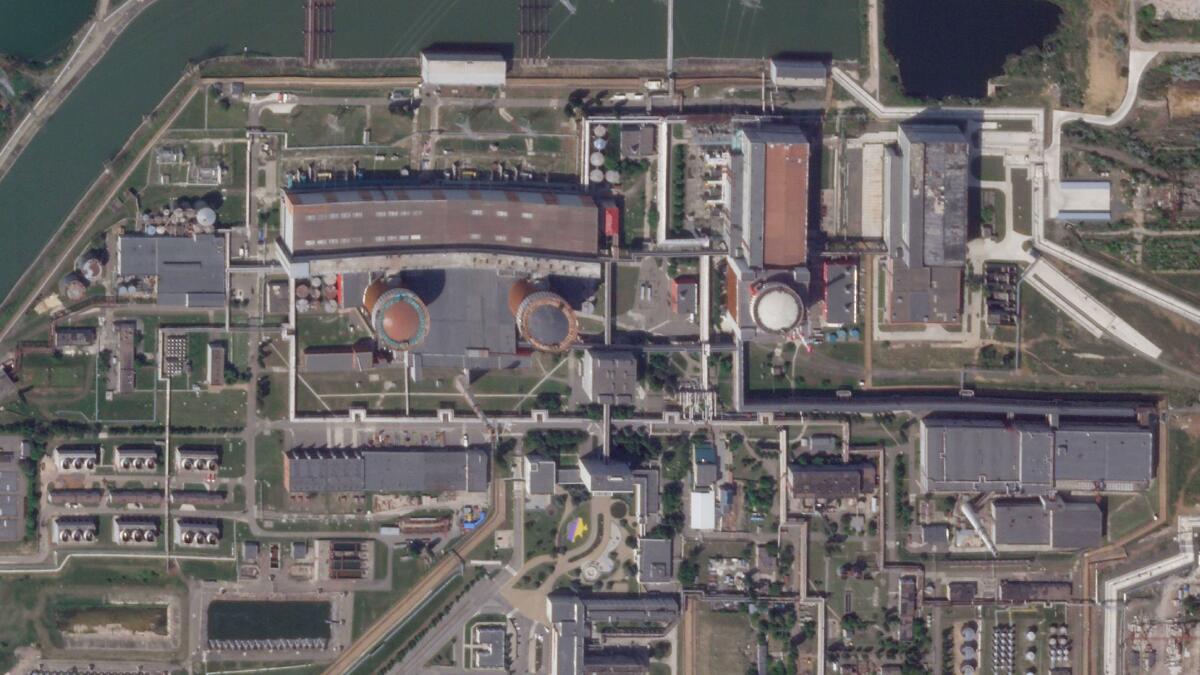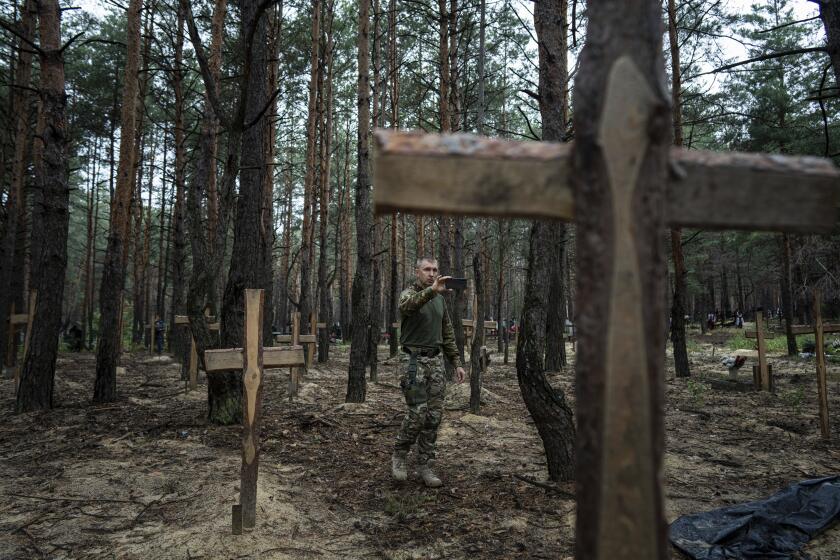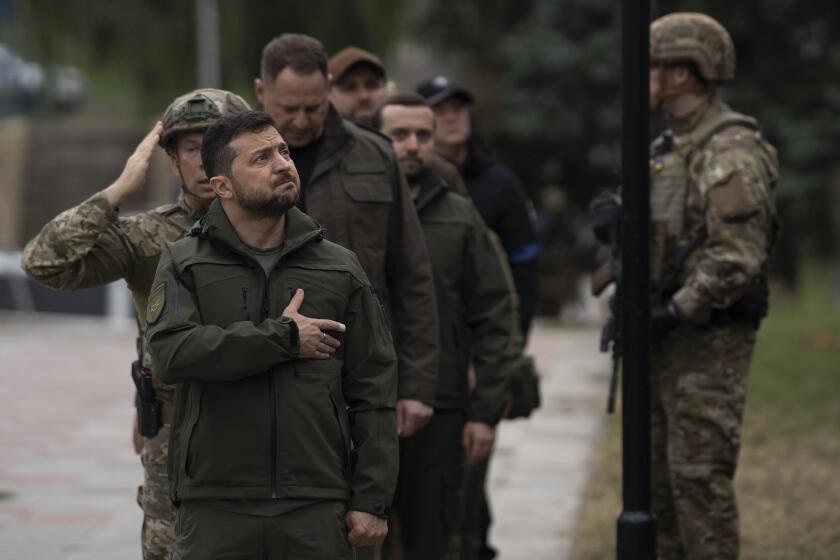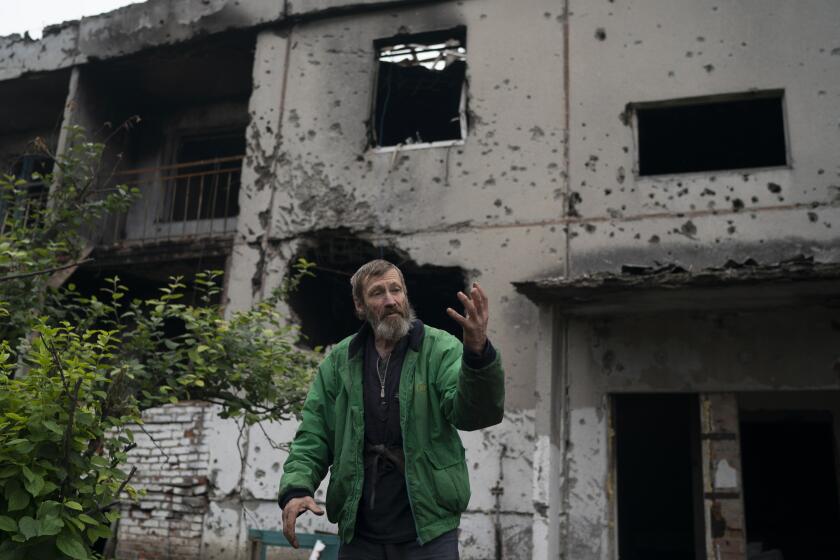Ukraine warns of ‘nuclear terrorism’ after Russian strike close to second power plant

- Share via
KYIV, Ukraine — A Russian missile blasted a crater close to a nuclear power plant in southern Ukraine on Monday, not damaging its three reactors but hitting other industrial equipment in what Ukrainian authorities denounced as an act of “nuclear terrorism.”
The missile struck within 325 yards of the reactors at the Pivdennoukrainsk nuclear power plant near the city of Yuzhnoukrainsk in Mykolaiv province, leaving a hole 6 1/2 feet deep and 13 feet wide, according to Ukrainian nuclear operator Energoatom.
The reactors were operating normally and no employees were injured, it said. But the proximity of the strike renewed fears that Russia’s nearly 7-month-long war in Ukraine might produce a radiation disaster.
This nuclear power station is Ukraine’s second-largest after the Zaporizhzhia nuclear power plant, which has repeatedly come under fire.
Following recent battlefield setbacks, Russian President Vladimir Putin threatened last week to step up Russian attacks on Ukrainian infrastructure. Throughout the war, Russia has targeted Ukraine’s electricity generation and transmission equipment, causing blackouts and endangering the safety systems of the country’s nuclear power plants.
The industrial complex that includes the Pivdennoukrainsk plant sits along the Southern Bug River about 190 miles south of the capital, Kyiv. The attack caused the temporary shutdown of a nearby hydroelectric power plant and shattered more than 100 windows at the complex, Ukrainian authorities said. The U.N.’s International Atomic Energy Agency said three power lines were knocked offline but later reconnected.
Black-and-white CCTV video released by Ukraine’s Ministry of Defense showed two large fireballs erupting one after the other in the dark, followed by incandescent showers of sparks. A time stamp on the video read 19 minutes after midnight.
The ministry and Energoatom both called the strike “nuclear terrorism.” The Russian Defense Ministry had no immediate comment.
Russian forces have occupied the Zaporizhzhia nuclear plant, Europe’s largest, since early after the invasion. Shelling has cut off the plant’s transmission lines, forcing operators to shut down its six reactors to avoid a radiation disaster. Russia and Ukraine have traded blame for the strikes.
Ukrainian authorities begin recovering bodies from a newly found mass burial site in a forest recaptured from Russian forces.
The IAEA, which has stationed monitors at the Zaporizhzhia plant, said a main transmission line was reconnected Friday, providing the electricity it needs to cool its reactors.
But the mayor of Enerhodar, where the Zaporizhzhia plant is located, reported more Russian shelling Monday in the city’s industrial zone.
While warning Friday of a possible ramp-up of strikes, Putin claimed his forces had so far acted with restraint but warned “if the situation develops this way, our response will be more serious.”
“Just recently, the Russian armed forces have delivered a couple of impactful strikes,” he said. ”Let’s consider those as warning strikes.”
A Ukrainian medic captured in the deadly siege of Mariupol tells U.S. lawmakers how Russians routinely tortured her and other prisoners, some fatally.
As well as infrastructure, Russian forces also continue to pound other sites. The most recent shelling killed at least eight civilians and wounded 22 others, Ukraine’s presidential office said Monday.
Overnight, Russian forces struck Nikopol and Marhanets across the Dnieper River from the Zaporizhzhia plant, damaging dozens of buildings and cutting power supplies to some sections of the cities, the presidential office said.
Russian strikes also hit Kramatorsk and Toretsk in the eastern Donetsk region, it said.
The mayor of the Russian-occupied eastern city of Donetsk, meanwhile, said Ukrainian shelling had killed 13 civilians and wounded eight there.
Ukraine’s sweeping counteroffensive against Russia’s invasion has reclaimed vast swaths of territory in the northeastern region of Kharkiv.
Patricia Lewis, the international security research director at the Chatham House think tank in London, said the attacks at the Zaporizhzhia plant and Monday’s strike on the Pivdennoukrainsk plant indicated that the Russian military was attempting to take Ukrainian nuclear plants offline before winter.
“It’s a very, very dangerous and illegal act to be targeting a nuclear station,” Lewis said in an interview. “Only the generals will know the intent, but there’s clearly a pattern.”
“What they seem to be doing each time is to try to cut off the power to the reactor,” she said. “It’s a very clumsy way to do it, because how accurate are these missiles?”
There’s not much left of this small village outside of Ukraine’s second-largest city.
Power is needed to run pumps that circulate cooling water to the reactors, preventing overheating and — in a worst-case scenario — a radiation-spewing nuclear fuel meltdown.
Other recent Russian strikes on Ukrainian infrastructure targeted power plants in the north and a dam in the south. They came in the wake of a sweeping Ukrainian counteroffensive in the east of the country that reclaimed Russia-occupied territory in the Kharkiv region.
Analysts have noted that beyond recapturing territory, challenges remain in holding it. In a video address Monday, Ukrainian President Volodymyr Zelensky said cryptically of that effort, “I cannot reveal all the details, but thanks to the Security Service of Ukraine, we are now confident that the occupiers will not have any foothold on Ukrainian soil.”
The Ukrainian successes in Kharkiv — Russia’s biggest defeat since its forces were repelled from around Kyiv in the invasion’s opening stage — have fueled rare public criticism in Russia and added to the military and diplomatic pressure on Putin. The Kremlin’s nationalist critics have questioned why Moscow has failed to plunge Ukraine into darkness yet by hitting all of its major nuclear power plants.
More to Read
Sign up for Essential California
The most important California stories and recommendations in your inbox every morning.
You may occasionally receive promotional content from the Los Angeles Times.














